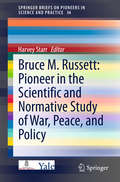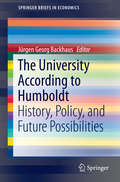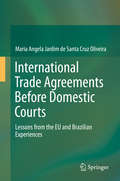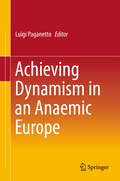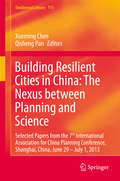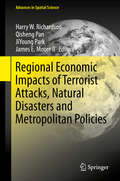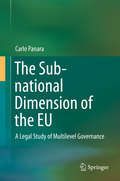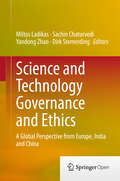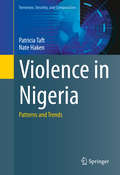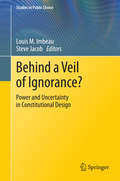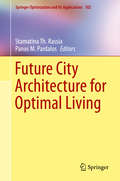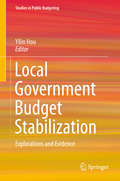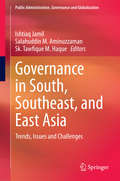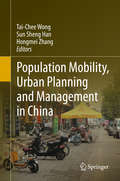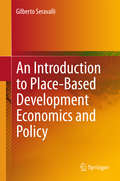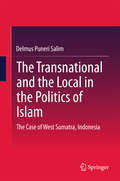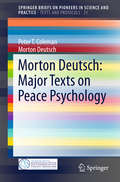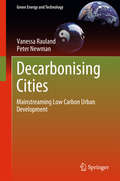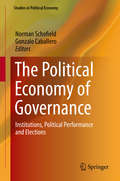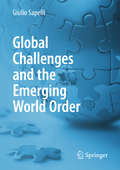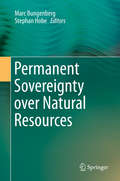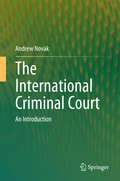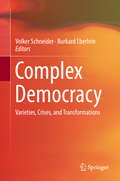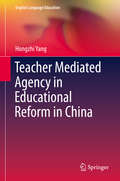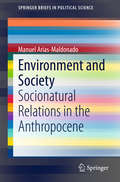- Table View
- List View
Bruce M. Russett: Pioneer in the Scientific and Normative Study of War, Peace, and Policy (SpringerBriefs on Pioneers in Science and Practice #34)
by Harvey StarrThis book provides a comprehensive treatment of Russett's scientific contributions, with key examples of his major studies. It will greatly benefit today's International Relations students, deepening their understanding of the field's theory and methods. Bruce M. Russett was a founder of, and continues to be a pioneer in, the empirical analytical study of international relations and foreign policy. He has produced groundbreaking works on methodology, data collection and the application of economics to the field of international relations--especially in the area of analytical relationships between theory, policy and normative standards for morality and ethics. His body of work has clarified and furthered our understanding of peace studies by addressing power and conflict, cooperation, integration and community, democratic/Kantian peace, economic development, dependency and inequality, and the relationships between domestic and foreign politics. Russett's academic achievements and standing are the result of his bringing these areas together as a coherent entity, based on his eclectic ability to "cross boundaries" with regard to academic disciplines, sub-disciplines, methods of data gathering and analysis, and broad theoretical perspectives, as well as basic and applied research.
The University According to Humboldt
by Jürgen Georg BackhausThis book discusses the philosophy and educational reforms initiated by Wilhelm von Humboldt as well as their legacy in the modern university system. It begins with a discussion of the history of the university from antiquity and the Middle Ages through the era of Humboldt's reforms and its remnants in and implications for the present day. The authors then delve into policy, outlining the key conflicts that have informed the development of university educational policy, such as the clash between academia and professional education, the coordination of public administration and educational institutions, and the perennial issue of funding. Humboldt's ideas are then discussed within an economic context, using his principals of the state to analyze the relationship between current models of household and family economics and German economic and social policy. The book is rounded off by a philosophical analysis of the institution of the university and concludes with an update of the remains Humboldt's reforms within the current university system. With its multidisciplinary approach to the study of higher education reform in Europe and its key players, this book will appeal to scholars of economic history, educational policy, and public administration as well as administrators and policy makers in higher education.
International Trade Agreements Before Domestic Courts
by Maria Angela Jardim de Santa Cruz OliveiraThis book addresses the role of domestic courts in the enforcement of international trade agreements by examining the experiences of Brazilian and the European Union courts. This comparative study analyzes the differences, similarities and consequences of Brazilian and European courts' decisions in relation to the WTO agreements, which have "direct effect" in Latin American emerging economies, but not in the European Union or other developed countries. It observes that domestic courts' enforcement of international trade agreements has had several unintended and counterproductive consequences, which were foreseeable in light of international scholarly debate on the direct effect of WTO agreements. It draws lessons from these jurisdictions' experiences and argues that the traditional academic literature that fosters domestic courts' enforcement of international law should be reconsidered in Latin America in relation to international trade agreements. This book defends the view that, as a result of their function and objectives together with the principles of popular sovereignty and democratic self-government, international trade agreements should not be considered to be self-executing or to have direct effect. This empirical work will be valuable to anyone interested in the effects of international trade rules at the domestic level and the role of domestic judges in international law.
Achieving Dynamism in an Anaemic Europe
by Luigi PaganettoThis book explores the reasons behind Europe's poor performance in terms of overall growth and its progressively diminishing role in the global context. Recognizing that the big challenge is to restore confidence and hope in Europe, potential solutions are discussed. The volume comprises a selection of contributions to the XXVI Villa Mondragone International Economic Seminar (Rome, 2014), the most recent of a series of seminars that have provided outstanding scholars with an opportunity to discuss key topics in economic research. In recent years the persistence of high unemployment and low growth has increased the Euroscepticism that has targeted the euro and the Brussels bureaucracy. Readers will find this book a fascinating source of information on current thinking regarding topics such as European industrial policy, European governance, unemployment, the euro and competitiveness, trade and financial integration, the Transatlantic Trade and Investment Partnership, anticorruption policies, and energy and climate policies. In particular, it examines the structural reforms and commitment to development that will be required for Europe to become a region characterized by social justice, dynamism, and opportunities for all.
Building Resilient Cities in China: Selected Papers from the 7th International Association for China Planning Conference, Shanghai, China, June 29 – July 1, 2013 (GeoJournal Library #113)
by Qisheng Pan Xueming ChenThis book discusses a range of planning and management issues related to building urban resiliency. It covers such topics as urban, environmental, and transportation planning, historical preservation, emergency relief and management, geographic information systems (GIS) and other technological applications. The book includes case studies of several cities and districts in China, including Shanghai, and a number of cities in the United States of America. Urban resiliency in the face of uncertainty is a priority for planning and governance in communities worldwide. In China, which has suffered many of the world's most devastating floods, earthquakes, and typhoons, preparing for the threat of disaster has long been an important planning objective. Recent calamities, such as the 2008 Winter Storms, the 2008 Wenchuan Earthquake, and the 2012 Beijing Floods have only made planning for resiliency more urgent. As planners work to prepare for such events, interdisciplinary collaboration becomes increasingly important. Planners need the tools and insights offered by other fields, including both the natural and social sciences. At the same time, these interdisciplinary relationships help shape the identity of urban-rural planning in its new role as one of China's primary academic disciplines. Thus, the nexus between planning and science is critically important in building resilient cities in China, and the Chinese planning experience can serve as an example to and benefit countries around the world.
Regional Economic Impacts of Terrorist Attacks, Natural Disasters and Metropolitan Policies
by Harry W. Richardson Qisheng Pan Jiyoung Park James E. Moore IIThis book presents a multiregional input-output model for the metropolitan area of Southern California, which helps to estimate the economic impact of simulated terrorist attacks on seaports, malls etc. as well as of natural disasters such as earthquakes and tsunamis. The authors also analyze the economic and social effects of metropolitan policies such as growth controls, neighborhood gentrification or road-congestion charges. The model presented in the book has evolved over a period of 25 years and requires a very substantial computer capacity.
The Sub-national Dimension of the EU
by Carlo PanaraThis book is the first monograph-form legal study on multilevel governance in the EU and represents a radical change in the approach to this topic. Particularly after the Treaty of Lisbon's entry into force, research on multilevel governance can no longer remain confined to the analysis of political dynamics or of soft law arrangements. Multilevel governance emerges as a constitutional principle in the European constitutional space, envisaging a method of governance based on the strong involvement of sub-national authorities in the creation and implementation of EU law and policy. Its foundation is in the mosaic resulting from the constitutional systems of the Union and its Member States. Multilevel governance arrangements play a fundamental part in achieving key Treaty objectives (such as subsidiarity, respect for the national identities of the Member States including regional and local self-government, openness, and closeness to the citizen). These arrangements lend legitimacy to EU decision-making, while also promoting constitutionalism and democracy in the EU.
Science and Technology Governance and Ethics
by Miltos Ladikas Sachin Chaturvedi Yandong Zhao Dirk StemerdingThis book analyzes the possibilities for effective global governance of science in Europe, India and China. Authors from the three regions join forces to explore how ethical concerns over new technologies can be incorporated into global science and technology policies. The first chapter introduces the topic, offering a global perspective on embedding ethics in science and technology policy. Chapter Two compares the institutionalization of ethical debates in science, technology and innovation policy in three important regions: Europe, India and China. The third chapter explores public perceptions of science and technology in these same three regions. Chapter Four discusses public engagement in the governance of science and technology, and Chapter Five reviews science and technology governance and European values. The sixth chapter describes and analyzes values demonstrated in the constitution of the People's Republic of China. Chapter Seven describes emerging evidence from India on the uses of science and technology for socio-economic development, and the quest for inclusive growth. In Chapter Eight, the authors propose a comparative framework for studying global ethics in science and technology. The following three chapters offer case studies and analysis of three emerging industries in India, China and Europe: new food technologies, nanotechnology and synthetic biology. Chapter 12 gathers all these threads for a comprehensive discussion on incorporating ethics into science and technology policy. The analysis is undertaken against the backdrop of different value systems and varying levels of public perception of risks and benefits. The book introduces a common analytical framework for the comparative discussion of ethics at the international level. The authors offer policy recommendations for effective collaboration among the three regions, to promote responsible governance in science and technology and a common analytical perspective in ethics.
Violence in Nigeria
by Patricia Taft Nate HakenThis book takes a quantitative look at ICT-generated event data to highlight current trends and issues in Nigeria at the local, state and national levels. Without emphasizing a specific policy or agenda, it provides context and perspective on the relative spatial-temporal distribution of conflict factors in Nigeria. The analysis of violence at state and local levels reveals a fractal pattern of overlapping ecosystems of conflict risk that must be understood for effective, conflict-sensitive approaches to development and direct conflict mitigation efforts. Moving beyond analyses that use a broad religious, ethnic or historical lens, this book focuses on the country's 774 local government areas and incorporates over 10,000 incidents coded by location, date and indicator to identify patterns in conflict risk between 2009 and 2013. It is the first book to track conflict in Nigeria during this period, which covers the Amnesty Agreement in the Niger Delta and the birth of Boko Haram in the North. It also includes conflict risk heat maps of each state and trend-lines of violence. The authors conclude with a discussion of the nuanced factors that lead to escalating violence, such as resource competition and trends in terrorism during this critical point in Nigeria's history. Violence in Nigeria is designed as a reference for researchers and practitioners working in security, peacebuilding and development, including policy makers, intelligence experts, diplomats, national defense and homeland security experts. Advanced-level students studying public policy, international relations or computer science will also find this book useful as a secondary textbook or reference.
Behind a Veil of Ignorance?: Power and Uncertainty in Constitutional Design (Studies in Public Choice #32)
by Louis M. Imbeau Steve JacobThis volume is a very interesting research project that includes the most careful work on constitutional power and limits to authority of which I am aware. In general, the contributors find that constitutional negotiations normally took place in settings where uncertainty was considerable. They also find that the more detailed the characterization of power relationships, the more liberal and durable the democracy tends to be. Roger D. Congleton This book addresses the issue of the impact of uncertainty in constitutional design. To what extent do constitution drafters and adopters make their decisions behind a veil of ignorance? More fundamentally, can we infer from constitutional texts the degree of uncertainty faced by constitution drafters and adopters? After an introduction (chapter 1), the book proceeds in two parts. The first part (chapters 2 to 4) introduces to the intellectual filiation of the project and to its theoretical and methodological foundations. The second part (chapters 5 to 13) presents nine case studies built on the same structure: historical account of the making of the Constitution, results of the content analysis of the constitutional text, and discussion of specific issues raised in the analysis. Chapter 14 concludes.
Future City Architecture for Optimal Living
by Panos M. Pardalos Stamatina Th. RassiaThis book offers a wealth of interdisciplinary approaches to urbanization strategies in architecture centered on growing concerns about the future of cities and their impacts on essential elements of architectural optimization, livability, energy consumption and sustainability. It portrays the urban condition in architectural terms, as well as the living condition in human terms, both of which can be optimized by mathematical modeling as well as mathematical calculation and assessment. Special features include: * new research on the construction of future cities and smart cities * discussions of sustainability and new technologies designed to advance ideas to future city developments Graduate students and researchers in architecture, engineering, mathematical modeling, and building physics will be engaged by the contributions written by eminent international experts from a variety of disciplines including architecture, engineering, modeling, optimization, and related fields.
Local Government Budget Stabilization
by Yilin HouThis book is the first comprehensive, full-scale treatment of the politics, law, and economics with regard to the policies and policy instruments for budget stabilization at the local level. It examines budget stabilization in the United States from the 1910s to 2010 (from adoption of public budgeting in this country through the Great Recession). In addition, it provides details on the methods and results of empirical tests of the effects of budget stabilization instruments on government operations, key/basic services provision, and some other aspects of social and economic life at the local level, including full-purpose governments (county, metro city, municipality, township, and village) as well as special (single-) purpose governments (like school districts and transportation districts). This book dissects an important and pressing issue in public financial administration, analyzes a lesson that has been in the learning process, especially in the United States, and identifies theoretical threads for scholarly refinement, which will be put into specific contexts of policy design and implementation. This book will be of interest to scholars in political science, economics, public choice and in public administration, where it will also appeal to policy-makers.
Governance in South, Southeast, and East Asia
by Ishtiaq Jamil Salahuddin M. Aminuzzaman Sk. Tawfique M. HaqueThis book explores and analyzes governance and policy issues in South, Southeast, and East Asia. It maps governance challenges and analyzes current trends from the perspectives of democracy, public policy, and public institutions. Regional public administration and governance systems have undergone some phenomenal changes over the last three decades and have played a key role in the economic progress of the area, especially in the Southeast and East Asian nations. Rich with country-specific evidence and analyses, the chapters in the book apply empirical and other research methods to examine shifting paradigms and best practices. This book develops an understanding of changes in the forms, process and practices of governance, both within the context of each nation and in a comparative perspective. The book will appeal to scholars, academics, students, and practitioners of public administration, political science, and policy issues.
Population Mobility, Urban Planning and Management in China
by Tai-Chee Wong Sun Sheng Han Hongmei ZhangThis volume contains essays that examine contemporary urban and regional planning and development in China. Through in-depth theoretical and empirical analysis, it provides insights into the urban policies and operational mechanisms of this colossal transitional economy which has presented unprecedented challenges and dynamics. Inside, readers will discover the causes and consequences of rapid urbanization that have led to a series of environmental, economic and social planning and management measures designed to achieve quality urban living. The essays also detail efforts in adopting the latest options in city building such as specific urban planning approaches in developing large city regions, building cities without slums, constructing new townships and green urbanism, including eco-city and sustainable transport. In addition, coverage explores financial management and support as a means to encourage urbanization and urban economic growth in less-developed regions. Overall, the volume offers a wealth of concrete, detailed information on conditions in different regions of China and features an extensive range of content, methods and theory. It provides readers with a comprehensive portrait of the chain relationship between rapid urbanization, spatial planning and management throughout the country. The book will serve as a useful reference for national and international consultancy services doing business or serving public interest in China. It will also be of interest to an international audience seeking a better understanding of urban development and planning in China, including university teachers, students, government agencies and general readers.
An Introduction to Place-Based Development Economics and Policy
by Gilberto SeravalliThis book introduces the reader to local development economics and policy, with a special focus on the place-based paradigm that covers its justification, its difficulties and the types of public intervention that it suggests. The starting point for the analysis is that economic development in lagging places is not to be expected as the result of a mechanism of automatic convergence between backward and advanced regions and that, therefore, the most appropriate development policy is not to maximize competition among all agents in all sectors and places. The failure of the Washington Consensus is examined, and the two competing positions to have emerged from this failure - spatially blind interventions and place-based policies - are contrasted. The main shortcoming of spatially blind policies, namely that immobile resources that could trigger or support a development process often remain untapped or "trapped", is emphasized. The limitations of the "big push" state intervention and wage flexibility solutions to this trap are analyzed and the merits of place-based policies that support intervention and can deal with uncertainty, risk and conflict are discussed.
The Transnational and the Local in the Politics of Islam
by Delmus Puneri SalimThis book explores the relationship between transnational and local Islam as expressed in public discourse and policy-making, as represented in the local press. It does so against the background of local governments in majority Muslim regions across Indonesia promoting and passing regulations that mandate forms of social or economic behaviour seen to be compatible with Islam. The book situates the political construction of Islamic behaviour in West Sumatra, and in Indonesia more generally, within an historical context in which rulers have in some way engaged with aspects of Islamic practice since the Islamic kingdom era. The book shows that while formal local Islamic regulations of this kind constitute a new development, their introduction has been a product of the same kinds of interactions between international, national and local elements that have characterised the relationship between Islam and politics through the course of Indonesian history. The book challenges the scholarly tendency to over-emphasise local political concerns when explaining this phenomenon, arguing that it is necessary to forefront the complex relationship between local politics and developments in the wider Islamic world. To illustrate the relationship between transnational and local Islam, the book uses detailed case studies of four domains of regulation: Islamic finance, zakat, education and behaviour and dress, in a number of local government areas within the province.
Morton Deutsch: Major Texts on Peace Psychology
by Peter T. Coleman Morton DeutschCommemorating Morton Deutsch's 95th birthday, this book presents ten major texts by this highly respected social psychologist on war and peace. This second volume presents Deutsch in his role as a leading social science activist on issues of war and peace - writing papers, making speeches and participating in demonstrations. After serving in the U. S. Air Force during World War II and being awarded two Distinguished Flying Cross medals, as a psychologist he was determined to work for a more peaceful world. Influenced by Kurt Lewin, who believed that nothing was as practical as a good theory, Deutsch pursued theoretical work on such issues as cooperation-competition, conflict resolution and social justice with regard to issues of war and peace. As President of the Society for the Study of Peace, Conflict and Violence, the Society for the Psychological Study of Social Issues and the International Society of Political Psychology, he helped to foster social science efforts to make for a more peaceful world.
Decarbonising Cities
by Peter Newman Vanessa RaulandThis book sets out some positive directions to move forward including government policy and regulatory options, an innovative GRID (Greening, Regenerative, Improvement Districts) scheme that can assist with funding and management, and the first steps towards an innovative carbon credit scheme for the built environment. Decarbonising cities is a global agenda with huge significance for the future of urban civilisation. Global demonstrations have shown that technology and design issues are largely solved. However, the mainstreaming of low carbon urban development, particularly at the precinct scale, currently lacks sufficient: standards for measuring carbon covering operational, embodied and transport emissions; assessment and decision-making tools to assist in design options; certifying processes for carbon neutrality within the built environment; and accreditation processes for enabling carbon credits to be generated from precinct-wide urban development. Numerous barriers are currently hindering greater adoption of high performance, low carbon developments, many of which relate to implementation and governance. How to enable and manage precinct-scale renewables and other low carbon technologies within an urban setting is a particular challenge.
The Political Economy of Governance
by Norman Schofield Gonzalo CaballeroUnderstanding the governance of nations is a key challenge in contemporaneous political economy. This book provides new advances and the latest research in the field of political economy, dealing with the study of institutions, governance, democracy and elections. The volume focuses on issues such as the role of institutions and political governance in society, the working of democracy and the electoral performance in several case studies. The chapters involve cutting edge research on many different countries, including the USA, Great Britain, Germany, Spain and the Third World. The authors of the chapters are leading scholars in political economy from America, Europe and Asia.
Global Challenges and the Emerging World Order
by Giulio SapelliThis book offers a fascinating overview of the challenges posed by the world's new geostrategic order and likely future directions. It opens with an unconventional view of the Arab Spring, identifying its origins in the relative US withdrawal from the Middle East caused by both the need for military disengagement for economic reasons and the discovery of shale gas and tight oil in the heart of the North American continent. The rise in the geostrategic importance of Putin's Russia is explored in this context. The implications of the worldwide economic crisis are analyzed in depth: the author's interpretation is that the world is entering a phase of unstable growth generated by hyper financialization and deflation. Against this background, the book explores the US attempt to trigger growth through the Transatlantic Trade and Investment Partnership, the impact of the Trans-Pacific Partnership (based on the US-Australia military alliance) in restraining China's advance, and the potential for Africa to become the driver of the world's economic future if it can resist Chinese penetration and continue the nation-building process.
Permanent Sovereignty over Natural Resources
by Marc Bungenberg Stephan HobeFifty years after the adoption of the Declaration on Permanent Sovereignty over Natural Resources by the General Assembly of the United Nations in December 1962, this volume assesses the evolution of the principle of permanent sovereignty over natural resources into a principle of customary international law as well as related developments. International environmental and human rights law leave unresolved questions regarding the limitations of this principle, e. g. extraterritorial and international influences such as the applicable criminal and tort law, as well as the extraterritorial and international promotion of good governance, including transparency obligations.
The International Criminal Court
by Andrew NovakThis book is about the International Criminal Court (ICC), a new and highly distinctive criminal justice institution with the ability to prosecute the highest-level government officials, including heads of state, even in countries that have not accepted its jurisdiction. The book explores the historical development of international criminal law and the formal legal structure created by the Rome Statute, against the background of the Court's search for objectivity in a political global environment. The book reviews the operations of the Court in practice and the Court's position in the power politics of the international system. It discusses and clarifies all stages of an international criminal proceeding from the opening of the investigation to sentencing, reparations, and final appeals in the context of its restorative justice mission. Making appropriate comparisons and contrasts between the international criminal justice system and domestic and national systems, the book fills a gap in international criminal justice study.
Complex Democracy: Varieties, Crises, and Transformations
by Volker Schneider Burkard EberleinThis book presents a state-of-the art collection of original contributions on democracy, addressing three related themes: the complexity of modern democracies and their structural diversity; coping strategies of democracies in times of crises; and current and potential trajectories and transformations of democracy. The first part of the book maps the democratic landscape by revealing the diversity of democratic political systems, through either comparative analysis or case studies on the specific nature of political and administrative systems in interest intermediation and identity construction. The second part presents articles that investigate the response of democracies to times of crisis, with an emphasis on political economies and policy processes within the European Union. The third part offers studies on democracies that explore their adaptive potential in the context of globalization and in that of broader technical, institutional or cultural changes.
Teacher Mediated Agency in Educational Reform in China
by Hongzhi YangThis book examines teacher agency in implementing English as a Foreign Language (EFL) curriculum reform in the Chinese university context. It theorizes the concept of teacher agency from a sociocultural theory perspective and draws on a study conducted in a conservative and less developed area in China. The book uses Engeström's activity theory and Vygotsky's concept of the Zone of Proximal Development (ZPD) to understand the nature and extent of teacher agency in adapting one's teaching with respect to beliefs, knowledge and instructional practices. The study concludes that curriculum reform in China needs to shift from reliance on 'top-down' policies to 'bottom-up' implementation that mobilizes local understandings and practices. One of the implications of this study is that transformative teacher education programs aimed at developing teacher pedagogical agency require that teachers have ongoing opportunities to design, develop and evaluate curriculum-based mediational means.
Environment and Society
by Manuel Arias-MaldonadoThis short book sets out to explore the concept of nature in the context of a changing reality, in which the extent of our transformation of the environment has become evident: What is nature and to what extent has humanity transformed it? How do nature and society relate to one another? What does the idea of a sustainable society entail and how can nature be understood as a political subject? What is the Anthropocene and how does it affect nature as both an idea and a material entity? Has nature perhaps "ended?" In addressing these questions, the author delivers a concise but meaningful study of contemporary understandings of nature, one that goes beyond the limits posed by a single discipline. Adopting a truly comprehensive perspective, the work incorporates classical disciplines such as philosophy, evolutionary theory and the history of ideas; new and mixed approaches ranging from environmental sociology to neurobiology and ecological economics and the emerging area of the environmental humanities and represents a growing branch of political thought that views nature as a new political subject.
